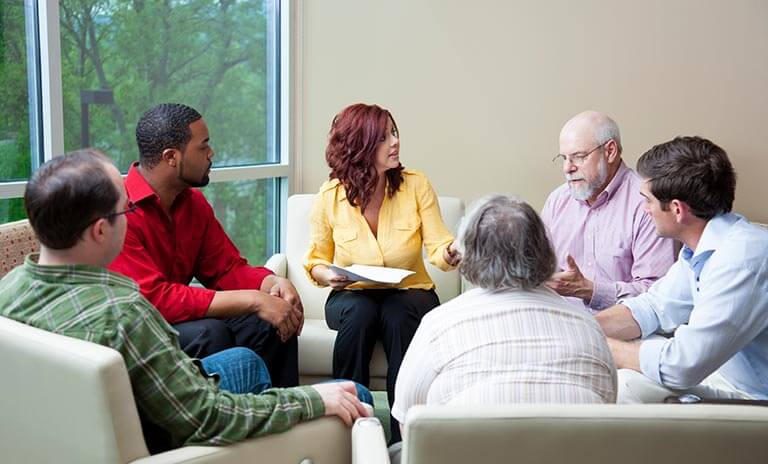Learn how to recognize the signs and symptoms of postpartum depression and get help for yourself or a loved one. Seven Hills Hospital helps individuals struggling with postpartum depression build a strong foundation for lasting recovery. Located near Las Vegas, Seven Hills is the leading provider of psychiatric and addiction treatment.
Understanding Postpartum Depression
Learn About Postpartum Depression
Postpartum depression is a general term referring to the presence of depressive symptoms that occur at the end of one’s pregnancy or immediately following the birth of a baby. While it is most commonly referred to as postpartum depression, the disorder as a whole is actually a combination of various forms, determined by the severity of one’s symptoms, as well as the length of time in which a woman experiences the symptoms. These forms are described in the following:
Major depressive disorder with peripartum onset, also referred to as “baby blues,” occurs when depressive episodes begin prior to the actual delivery of the baby. It is said that 50% of postpartum depression cases have a peripartum onset and tend to be mild or moderate in severity. While this period typically only lasts for a few days or a week or two, professionals in the field say that women who experience baby blues are at a higher risk of suffering from a postpartum major depressive episode.
Postpartum major depressive episodes occur when the signs and symptoms of peripartum onset depression are more intense and longer lasting. These episodes are characterized by a woman experiencing such intense symptoms that they interfere with her ability to care for her baby, as well as her ability to manage other daily tasks. Postpartum depression can last for months or longer so it is important to start treatment as soon as possible.
Postpartum mood episodes with psychotic features (more commonly known as postpartum psychosis) is a rarer condition that most commonly occurs within the first two weeks after delivery. When women experience postpartum psychosis, their symptoms are so severe that they can be dangerous. Women in a state of postpartum psychosis may experience things such as command hallucinations where they are being told to the kill their baby, or experience delusions such as believing that the infant is possessed. Women suffering from postpartum psychosis are at a high risk of being a danger to themselves and their children.
Statistics
Postpartum Depression Statistics
According to the American Psychological Association, between 9 and 16% of women suffer from postpartum depression. Women who suffered from the disorder in a previous pregnancy are believed to be 41% more likely to suffer from it in a subsequent pregnancy.
Causes & Risks
Causes and Risk Factors of Postpartum Depression
Women can experience postpartum depression during or following any pregnancy, not just their first. There is not any one specific identified cause that is indicative of why some women experience postpartum depression while others do not. However, it is believed by professionals in the field that there are certain physical, emotional, and lifestyle factors that may play a role in its development because pregnancy majorly impacts these aspects of a woman’s life.
Genetic: Having a family history of mental illness, especially depression or bipolar disorder, can place individuals at a higher risk of developing postpartum depression. The fact that mental illnesses are known to run in families indicates that there is a strong genetic link in their development.
Physical: When a woman becomes pregnant, there are countless changes that her body begins going through. In addition to dramatic changes in hormone levels, women experience changes in blood pressure, blood volume, metabolism, and immune system. With all of these physical changes occurring at such a rapid rate, the chemicals in the brain also begin changing and, in some cases, can become imbalanced, leading to the onset of depressive symptoms.
Environmental: There are a number of environmental and lifestyle factors that can play a role in the development of postpartum depression. When women give birth, they are likely to be sleep-deprived and feel overwhelmed, which can cause them to experience difficulty handling even the most minor of problems. This can then lead to feelings of guilt that they are not able to take care of the things the way that they would like to, throwing them into an even deeper state of depression. Women may also feel anxious about their ability to care for their child, feel less attractive, or, in extreme cases, feel as though they have lost their own sense of identity. Some women may also struggle with breast-feeding complications, which can lower their sense of worth as a mother.
Risk Factors:
- Personal and/or family history of depression
- Having suffered from postpartum depression in a previous pregnancy
- Personal history of mental illness (women who have bipolar disorder are at an increased risk of developing postpartum psychosis)
- Unplanned or unwanted pregnancy
- Relationship problems with one’s spouse or significant other
- Complicated delivery
- Lack of a strong support system
- Financial difficulties
- High levels of stress
- Having older children that one is responsible for caring for in addition to the new baby
- Having a demanding or difficult infant
- History of substance abuse
- Having experienced physical and/or sexual abuse as a child
- History of miscarriages or stillborn births
Signs & Symptoms
Signs and Symptoms of Postpartum Depression
The signs and symptoms of postpartum depression vary in severity depending upon the stage of the disorder that the woman is suffering from. The following are examples of different signs and symptoms that may be present in a woman who is struggling with postpartum depression:
Major depressive disorder with peripartum onset:
- Anxiety
- Sadness
- Mood swings
- Crying spells
- Increased levels of irritability
- Difficulty sleeping
- Difficulty concentrating
Postpartum major depressive episodes:
- Insomnia
- Overwhelming feelings of fatigue
- Loss of appetite
- Intense irritability
- Intense anger
- Severe mood swings
- Loss of interest in things one used to enjoy
- No sex drive
- Experiencing difficulty bonding with one’s baby
- Isolating oneself from family and friends
- Intense feelings of guilt, shame, and/or inadequacy
- Suicidal ideation
- Thoughts of harming one’s baby
Postpartum psychosis:
- Disorientation
- Delirium
- Confusion
- Visual and auditory hallucinations, including command hallucinations where the woman hears voices telling her to harm or kill her child
- Delusions
- Paranoia
- Mania
- Attempting to harm one’s baby
- Self-harming behaviors
- Memory loss
- Incoherence
- Making irrational statements
Lasting Effects
Effects of Postpartum Depression
The effects of postpartum depression can be detrimental not only on the mother, but on her child as well. When a woman is suffering from postpartum depression, she may have difficulty reacting to her child in appropriate ways. The lack of appropriate interaction can impact a child’s cognitive, behavioral, and physical development. Studies have also shown that when mothers are depressed during their child’s first three months of life end up being more irritable, to act in a hostile manner, to be less engaged with the world around them, and to exhibit less emotion than mothers who are not depressed. In the most severe and tragic cases, postpartum psychosis can lead to infanticide
Co-Occurring Disorders
Co-Occurring Disorders
The different forms of postpartum depression can occur alongside a number of other mental health disorders, including:
- Other depressive disorders
- Bipolar disorder
- Generalized anxiety disorder
- Obsessive-compulsive disorder
- Specific phobia
- Panic disorder





















